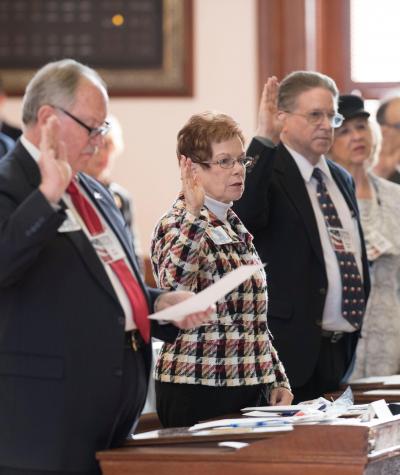This blog post has been adapted from a white paper produced by the National Task Force on Election Crises.
As the November general election draws closer, Americans are asking questions about how our election systems work. Campaign Legal Center (CLC) has staffers serving on the National Task Force on Election Crises and are prepared to respond to such questions.
One question has been: Can a state legislature substitute its judgment for the will of the people by directly appointing their preferred slate of electors after Election Day?
The answer? No.
State Legislatures Are Prohibited by Federal Law from Usurping the Will of the Voters After the Election
Americans should rest assured that a state legislature’s post-Election Day substitution of its own preferences would violate federal law.
While the Constitution delegates to each state’s legislature the power to direct the manner for appointing its slate of electors for president, it gives Congress the power “to determine the time of chusing Electors.”
Congress, in turn, has mandated by law that is the “Tuesday after the first Monday in November, in every fourth year succeeding every election of a President and Vice President”—which falls on Nov. 3, 2020.
For well over a century, the laws in every state have provided for their state’s electors to be chosen through a popular election.
Although state legislatures could theoretically amend their laws to provide for legislative appointment of presidential electors if they acted before Election Day, it would violate a federal statute and the Constitution to do so after the Nov. 3 date set by Congress.
What is the Electoral Count Act, and Why Does It Disincentivize States from Trying to Do This?
If a state legislature attempted to appoint its preferred electors in violation of the election process mandated in existing state law, it would deprive the state of federal-law protections that require Congress to honor the state’s chosen electors.
The Electoral Count Act (ECA) includes a “safe harbor” provision that treats as “conclusive” a state’s chosen slate of electors if two criteria are satisfied: (1) the electors must be chosen under laws enacted prior to Election Day, and (2) the selection process, including final resolution of any disputes, must be completed at least six days prior to the meetings of the electors.
This year, the ECA “safe harbor” deadline is Dec. 8, 2020.
A post-Election Day appointment of a state legislature’s preferred slate of electors would almost always deviate from the legal process for appointing electors established by the state prior to Election Day (criterion #1).
Although the ECA safe harbor criteria are not mandatory, the consequences of failing to adhere to them are significant.
If a state legislature’s actions cause the state to lose safe harbor protection, this leaves Congress to decide which electors to count from a state, without mandatory deference to the preferences of either the state’s voters or legislature.
A State Legislature Substituting Its Preferences for the Will of the Voters Raises Constitutional Due Process and Equal Protection Concerns, Too.
The Supreme Court has explained that “[w]hen the state legislature vests the right to vote for President in its people, the right to vote as the legislature has prescribed is fundamental,” and is subject to constitutional due process and equal protection guarantees.
The court has also recognized that once a state has granted its citizens the right to vote on equal terms “the State may not, by later arbitrary and disparate treatment,” devalue the votes of certain citizens.
The due process clause, in particular, protects citizens’ reasonable reliance on the expectation under state law that they will be able to meaningfully exercise their fundamental right to vote.
Congress Recognized That Vote-Counting and Related Disputes May Continue Beyond Election Day; Those Delays Do Not Entitle State Legislatures to Intervene.
Under the ECA’s safe harbor provision, states may take up to five weeks to determine the final outcome of their elections, including by resolving any disputes, and still have their election results treated as “conclusive” by Congress as long as the electors were chosen under state laws enacted prior to Election Day.
And even if disputes are not resolved by the safe harbor date, states have six more days before the Electoral College meets. This timeline established by Congress undermines any notion that a state legislature can step in and choose its own slate of electors because a close election is taking some time to resolve.

